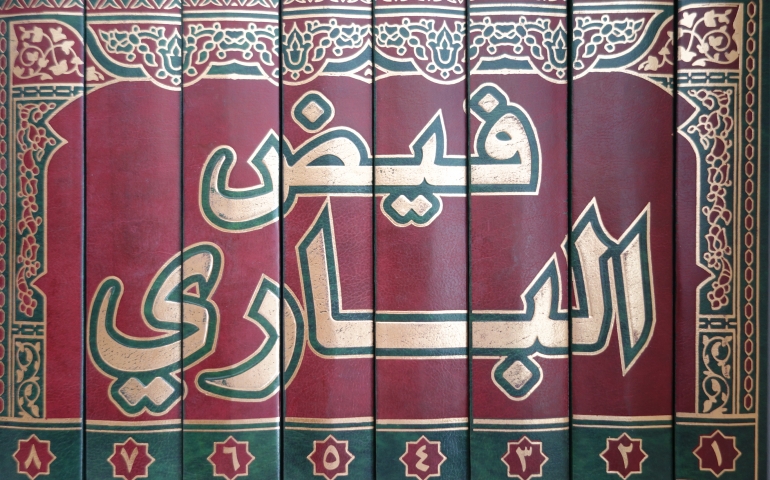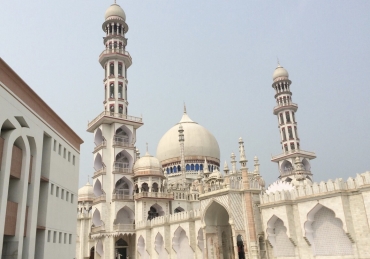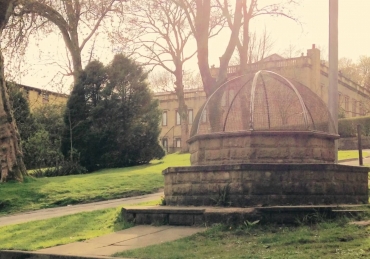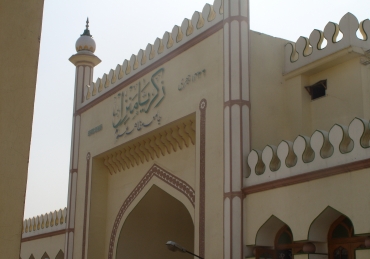Short profile of Mawlānā Muḥammad Badr ʿĀlam Mīrtī
Two facts have prompted me to learn more about and pen a brief profile of Ḥaḍrat Mawlānā Badr ʿĀlam Mīrtī (d. 1385/1965). First, on his visit to the UK last year, our beloved Ḥaḍrat Mufti Aḥmad Khānpūrī (b. 1365/1946) mentioned that Mawlānā Badr ʿĀlam’s grave in the Baqīʿ cemetery was dug several years after he had passed away to re-use the grave for burial, as is customary. However, his body and shroud were found to be intact and therefore his grave was not re-used. This exercise was repeated after a few years and once again his body and shroud were found to be intact [Mufti Fārūq Mīrthī (d. 1436/2015) adds that this exercise was repeated a third time and the result was the same. The grave was then sealed and marked that it is not to be re-used, see Fikr Ākhirat, p.404]. Second, upon hearing this, my respected father Mufti Shabbīr Aḥmad (b. 1376/1957) mentioned to Mufti Aḥmad Khānpūrī that his father Ḥājī Aḥmad Ismāʿīl Patel (d. 1409/1988) had a very close relationship with Ḥaḍrat Mawlānā Badr ʿĀlam, which probably developed when the latter moved from Deoband to Dabhel, Gujarat, India. Such was the relationship that when Ḥājī Aḥmad decided to migrate from Malawi, where he had moved to from India, Mawlānā Badr ʿĀlam offered to make arrangements for him and the family to move to the blessed city of Madīnah, where he had already moved to. Allah Almighty had planned otherwise and Ḥājī Aḥmad moved with his family to the UK. Ḥājī Aḥmad was not a scholar, however, he had love for the scholars and saints and a passion to build Masjids and spread Islamic books. Famously known as Aḥmad Bāpū in Malawi, the Masjid he built in Zomba in 1962 is a landmark in the city. It is a result of his association with scholars and saints combined with his passion for charitable endeavours that thirty-six of his grandchildren and many more from the great-grandchildren are scholars. I therefore thought it useful to share a brief profile of Mawlānā Badr ʿĀlam Mīrtī who impacted on the lives of Ḥājī Aḥmad and many thousands of people worldwide.
Birth and Early Life
Mawlānā Badr ʿĀlam Mīrtī was born in 1316 (1898) in Budaun, Uttar Pradesh, India, which is located 220km to the west of Delhi. Mīrtī is an attribution to the city of Meerut which is located 80km to the North East of Delhi, which was probably the place of his ancestral home. Mawlānā was born into a noble family. His father Ḥājī Tahūr ʿAlī was a Police Officer. He was extremely truthful and his piety was such that since the age of sixteen, his Tahajjud Ṣalāh was never missed even during his travels. He had performed Hajj seven times and would say to his son that he has never lied. When he was passing away he said to Mawlānā Badr ʿĀlam, “We have not left rupees behind for you, however, we have not spent even a rupee of ḥarām in your body.”
Mawlānā Badr ʿĀlam began his studies by learning how to recite the Qurʾān. He also enrolled at an English school in Allahabad where he studied for several years. On one Friday, he visited a local Masjid in Allahabad and listened to a speech by the great scholar Ḥakīm al-Ummah Mawlānā Ashraf ʿAlī Thānawī (d. 1362/1943). The speech had such an impact on him that despite his young age, he decided to leave the English school and pursue Islamic education. He returned home and informed his father of his intention at which he initially expressed anger. As he continued to insist, his father wrote a letter to Mawlānā Khalil Aḥmad Sahāranpūrī (d. 1346/1927) outlining all the details. Mawlānā replied that you should be grateful to Allah, avoid being a barrier and grant permission happily.
Thus, in 1330 (1912), Mawlānā enrolled at the famous seminary Maẓahir al-ʿUlūm in Saharanpur and studied for six years before graduating as a scholar. (Some sources suggest he studied in Saharanpur for eight years starting at the age of eleven, see Tarjumān al-Sunnah, 4:16-17). His teachers here included great luminaries such as Mawlānā Khalil Aḥmad Sahāranpūrī (d. 1346/1927), Mawlānā Ẓafar Aḥmad ʿUthmānī (d. 1394/1974), Mawlānā Thābit ʿAlī al-Burqāḍwī and Mawlānā ʿAbd al-Laṭīf al-Burqāḍwī (d. 1373/1953-4). The following year, in 1337 (1919), he was appointed as a teacher at the seminary, a role which he appears to have fulfilled for one or two years.
From Saharanpur to Deoband
As his thirst for studying and knowledge had not been fully quenched, Mawlānā Badr ʿĀlam decided he wanted to study further. Thus, he travelled from Saharanpur to Deoband with the intention of repeating the final year of studying the ḥadīth books. In 1339 (1921), he graduated from Darul Uloom Deoband after having studied under great luminaries such as ʿAllāmah Anwar Shāh Kashmīrī (d. 1352/1933), Mufti ʿAzīz al-Raḥman ʿUthmānī (d. 1347/1928), ʿAllāmah Shabbīr Aḥmad ʿUthmānī (d. 1369/1949) and Mawlānā Sayyid Aṣgar Ḥusayn Deobandī (d. 1364/1945). The following year in 1340, he was appointed to teach in Darul Uloom Deoband, a role which he fulfilled until 1346 (1927). This demonstrates his teachers’ confidence in him in Deoband and also prior to this in Saharanpur.
It was during this period that Mawlānā established a spiritual relationship with Mufti ʿAzīz al-Raḥman ʿUthmānī (d. 1347/1928) in the Naqshbandi order. Mufti ʿAzīz al-Raḥman was the first official Mufti of Darul Uloom Deoband, a post which he held for forty years during which he wrote at least 37561 Fatāwā. His Fatāwā are regarded in high esteem and serve as a reference for Muftis worldwide. Along with his academic credentials, Mufti ʿAzīz al-Raḥman was a saint who had ijāzah in taṣawwuf from the second Principal of Darul Uloom Deoband, Ḥaḍrat Mawlānā Shāh Rafīʿ al-Dīn Deobandī Naqshbandī (d. 1308/1890), who was the disciple of Shāh ʿAbd al-Ganī al-Mujaddidī (d. 1296/1879). Mufti ʿAzīz al-Raḥman was extremely humble and compassionate, such that he would regularly visit the widows of Deoband after ʿAṣr Ṣalāh and go to the market place to purchase shopping for them on their behalf and carry the goods on his shoulder no matter how heavy. In addition to this, in rainy seasons, he would climb on the roof of the houses of the poor in rainy seasons and repair their roofs. All of this whilst he was the Grand Mufti of India. Mawlānā Badr ʿĀlam benefited from him immensely and after his demise referred himself to one of Mufti ʿAzīz al-Raḥman’s disciples, Ḥadrat Mawlānā Qārī Muḥammad Isḥāq Mīrtī (d. 1364/1945), who granted him ijāzah in taṣawwuf. Qārī Muḥammad Isḥāq who was a passionate advocate of the Sunnah would remark, “If Allah Almighty asks me on the day of Qiyāmah, what have you brought? I will present Mawlānā Muḥammad Badr ʿĀlam.”
What is remarkable is that both Shāh ʿAbd al-Ganī al-Mujaddidī and Mawlānā Shāh Rafīʿ al-Dīn passed away in the blessed city of Madīnah, an honour shared by Mawlānā Badr ʿĀlam.
From Deoband to Dabhel
In 1346 (1927), due to some disagreements and misunderstandings, ʿAllāmah Anwar Shāh Kashmīrī (d. 1352/1933) decided to leave Darul Uloom Deoband and moved to Dabhel in Gujarat. Many of his close associates and students also left with him, including Mawlānā Badr ʿĀlam who taught at the seminary in Dabhel for seventeen years. The books he taught here included Sunan al-Tirmidhī, Shamāʾil and Mishkāt al-Maṣābīḥ.
For the first five years, despite his teaching commitments, Mawlānā participated in the Ṣaḥīḥ al-Bukhārī lectures of ʿAllāmah Kashmīrī and made notes, which were published from Cairo in Arabic in four volumes in 1357 (1938) a few years after his teacher’s demise. This book Fayḍ al-Bārī is in reality a significant contribution from Mawlānā in sharing the invaluable gems and research of ʿAllāmah Kashmīrī. The commentary is arguably the most famous and important collection to shed light on ʿAllāmah Kashmīrī’s knowledge and insight. It has joined the ranks of the other Arabic commentaries of the Ṣaḥīḥ such as Fatḥ al-Bārī and others. Mawlānā Badr ʿĀlam also wrote some footnotes which are also published by the name of al-Badr al-Sārī. These together with his other books reflect his proficiency in the Arabic language as well as his insight and in-depth knowledge. It is worth noting that when Mawlānā would participate in the lessons of his teacher in Dabhel, he would sit among the students despite the fact that he was also a teacher of those same students at other times of the day. In fact, Mawlānā’s respect was such that he would never sit in his teacher’s position, even after ʿAllāmah Kashmīrī’s demise.
Subsequently, in 1362 (1943), Mawlānā was appointed by the Delhi based Nadwat al-Muṣannifīn (a consortium of writers) to write a comprehensive ḥadīth collection in Urdu with a unique order focusing on addressing the challenges and needs of his era. Four volumes were written by the name of Tarjumān al-Sunnah and the book has been published several times. The first volume was published before the partition whilst the remaining volumes were published later, with the final volume being published after Mawlānā’s demise. Shaykh Muḥammad Yūsuf Binorī (d. 1397/1977) writes regarding this book and Fayḍ al-Bārī and its footnotes, “These two books are unmatchable masterpieces which will serve as a living memory for him as long as the world remains and also be a source of benefit for scholars.” Shaykh Binorī further writes in relation to his third and final major work Jawāhir al-Ḥikam that it is a beneficial three volume collection of ḥadīths with heart touching commentary aimed at the rectification of the general public. He adds, “It is a good reflection of the contentment of his heart (sharḥ ṣadr).”
From Dabhel to Pakistan
After spending seventeen years in Dabhel, when British rule in the sub-continent ended and partition occurred in 1367 (1947), Mawlānā decided to move to Pakistan and join Darul Uloom al-Islamiyyah in Tando Allahyar, Sindh as lecturer of ḥadīth and also the Vice Principal. During the next five years, Mawlānā worked closely with the senior scholars of Pakistan including Mufti Muḥammad Shafīʿ ʿUthmānī (d. 1396/1976) on a range of initiatives including establishing an Islamic constitution and system of governance and refuting the Qadiyani (Ahmadi) movement. His speeches were popular amongst the masses from his time in India and he was famous for refuting the Qadiyani group and championing the cause of the finality of the Prophethood of our beloved Prophet Muḥammad ﷺ.
It was worth noting here that prior to the partition, Ḥaḍrat Shāh Gulām Muḥammad Mujaddidī Naqshbandī Kābulī (d. 1371-2/1952) moved from Jalalabad in Afghanistan to Navsari which is 13km from Dabhel. Shāh Gulām Muḥammad was a senior saint from the Naqshbandī order. Subsequently, after the partition he moved to Karachi. Mufti Muḥammad Shafīʿ ʿUthmānī (d. 1396/1976), who performed his Janāzah Ṣalāh, writes that Shāh Gulām told him once that he was performing Iʿtikāf in Masjid Nabawī, and he saw a man come in the second half of the night and said Salām at the grave of the Prophet ﷺ. There was a response from inside the grave which Shāh Ghulām heard, not only on that night but also subsequent nights. Mawlānā Margūb Lājpūrī (b. 1383/1963) narrates that he heard Mawlānā Qārī Ismāʿīl Samnī (d. 1435/2014) say that on one occasion Shāh Gulām Mujaddidī told his father that the Prophet ﷺ instructed him in his dream to nurture and focus his attention on Mawlānā Badr ʿĀlam and Mawlānā Margūb Aḥmad Lājpūrī (d. 1382/1962), the former Head Mufti of Burma. Both were subsequently granted ijāzah in taṣawwuf (Tadhkirat al-Margūb, p.92). After the partition, Mawlānā Badr ʿĀlam maintained his relationship with Shāh Gulām Mujaddidī in Pakistan.
From Pakistan to the blessed city of Madīnah
It was always Mawlānā’s ardent desire to migrate to the blessed city of Madīnah and pass away there. The following is what Mawlānā wrote under the ḥadīth in Ṣaḥīḥ al-Bukhārī (1890) wherein the leader of believers ʿUmar (may Allah be pleased with him) supplicated, “O Allah, grant me martyrdom in your path and make my death in the city of your beloved”:
وأقول: اللهم هذه دعوة مستجابة من خليفة خليفة حبيبك النبي الأمي، فأنا أيضا أدعوك بها، فاستجب لي، ولا تجعلني أشقى خلقك، اللهم اجعل حبك أحب الأشياء إلي، واجعل بلدة رسول أحب البلاد إلي، ولا تمني حتى أكون بها، فإنها بلدة يحبها رسولك، وتحبها لرسولك، وأنا أحبها لحبك إياها لرسولك، وحب رسولك إياها، فتوفني وأنا بها، فقد أممتك برجائي فلا تخيبني، اللهم هذه دعوة راج، دعاك بها، فاقبلها فإنك قدير، وتيسير كل عسير عليك يسير، بحرمة سيد الأنبياء البشير النذير، وآله الأزكى والأطهر من الماء النمير، استجب لي يا خبير يا بصير، آمين آمين آمين (البدر الساري على فيض الباري ٣/٣١٩)۔
This was his sincere supplication to Allah, which reflects how much love he had for the blessed city of Madīnah.
His supplication was accepted, and in 1372 (1952), Mawlānā migrated for a second time from Pakistan to the blessed city of Madīnah. During the next ten years or so, Mawlānā attended the Masjid Nabawī regularly and devoted these final years of his life to worship and the pursuit of knowledge and writing. Ḥakīm al-Islām Qārī Muḥammad Ṭayyib explains in his preface to Fatāwā Darul Uloom Deoband (1:37) that Mawlānā Badr ʿAlām focused on the spirituality of his associates during his stay in the blessed city of Madīnah and also prior to this in Pakistan and India. Ḥakīm al-Islām writes, “Today, by the grace of Allah, Mawlānā has a group [of spiritual pupils] in Madīnah. Pilgrims from different parts of the world refer themselves to him. This is the fayḍ (effusion) of the Naqshbandī order which reached him via the chain of Ḥaḍrat Mufti Aʿẓam [Mufti ʿAzīz al-Raḥmān].”
Mawlānā’s son, Mawlānā Āftāb explains that Mawlānā had so much respect for Masjid Nabawī that he would always walk looking down and he would remain silent with full concentration and devotion. During this time, he also wrote a short treatise Khulāṣah Zubdat al-Manāsik, which was also translated in Gujarati and English, along with the other books such as the translation of al-Ḥizb al-Aʿẓam and also some poetry. Mawlānā’s schedule in the final parts of his life was that he would listen to the translation of the Qurʾān by Shāh ʿAbd al-Qādir. When the pilgrims would come, he would render advice after ʿAṣr Ṣalāh and thousands of people would benefit.
In 1381 (1961), Mawlānā fell extremely ill following an accident and was bed ridden until his demise four years later. Despite his illness, he dictated the three volume Jawāhir al-Ḥikam, which is his major final work, as mentioned above. It was during this period towards the end of 1384 (1965) that Shaykh ʿAbd al-Fattāḥ Abū Guddah (d. 1417/1997) visited the blessed city of Madīnah and brought with him some copies of his annotated edition of al-Ajwibat al-Fāḍilah of Mawlānā ʿAbd al-Ḥayy Laknawī (d. 1304/1886) to gift to the senior scholars of the blessed city of Madīnah. Shaykh ʿAbd al-Fattāḥ writes:
‘And at the forefront of these senior scholars was our Shaykh, the ʿAllāmah, the Muḥaddith, the jurist, the intelligent, the clever, the proficient, Shaykh Muḥammad Badr ʿAlām al-Mīrtī al-Hindī, a resident in the abode of migration [referring to the blessed city of Madīnah]. I went to visit him at his residence. He had been affected by an incapacitating illness. This confined him permanently to his bed and prevented him from studying and satiating himself with knowledge as he desired. So, I presented to him a copy of the book al-Ajwibat al-Fāḍilah. He welcomed it, accepted it and praised the book. He said to me, “I purchased this book as soon as it arrived in the illuminated city of Madīnah, and as you can see me, I do not have the ability to read and study as I wish, however, my intention in purchasing it is to leave behind books of knowledge for my children and family. This is better inheritance for them than wealth.” These words were an invaluable lesson for me, I benefited from them a lot and it is because of this, I have mentioned here this incident regarding the Shaykh, may Allah The Almighty have mercy on him.’
Demise
After four years of being bedridden, enduring difficulties and exercising patience, content with the divine decree, Ḥaḍrat Mawlānā departed from this world in the blessed city of Madīnah during the night of Friday 5 Rajab 1385 (29 October 1965).
His Janāzah Ṣalāh was performed in Masjid Nabawī after Jumuʿah Ṣalāh. His son Mawlāna Āftāb Aḥmad wrote in a letter to Ḥājī Aḥmad Ismāʿīl Patel (available on this link) and others:
“The Janāzah Ṣalāh was performed after Jumuʿah Ṣalāh and then we went to Jannat al-Baqīʿ. The crowd of people was such that it is not seen here often and it is beyond description. Then, that place was granted in Jannat al-Baqīʿ by Allah Almighty which Ḥaḍrat, may Allah have mercy on him, eagerly desired, at the feet of the mothers of believers. This is now his final resting place.”
Mawlānā Āftāb writes in the preface to the fourth volume of Tarjumān al-Sunnah that before his demise, Mawlānā started to witness scenes from the world of the hereafter. Mawlānā would remark, “Whatever I can see, if I were to share it with you, you will not be able to bear it.” Mawlānā would also comment that he can experience some special fragrance. After his demise, Mawlānā’s face was illuminated with a smile and there was a fragrance emitting from his body.
May Allah Almighty shower His mercy on Ḥaḍrat Mawlānā Badr ʿĀlam and benefit the Ummah through his publications and discourses. Some of his discourses are presented below for the benefit of readers.
Discourses
- I heard Ḥaḍrat Mawlānā ʿAbdullāh Kāpodrawī (b. 1352/1933) say in London in 1438/2017, “Mawlānā Badr ʿĀlam Mīrtī told me in the illuminated city of Madīnah to inform the teachers: When you teach [the Mukhtāṣr of Imam] Qudūrī, do not try to teach Fatḥ al-Qadīr. When you teach the translation of the Qurʾān, do not try to teach [the Tafsīr of] Ibn Kathīr.”
- Mawlānā Badr ʿĀlam writes, “Every era has its needs, therefore there is no need to be adamant in thinking that any steps undertaken to write a book with a new style should be regarded a crime” (Tarjumān al-Sunnah, 1:15). He adds, “If Imam Bukhārī was alive today, he would have structured his Ṣaḥīḥ differently to address the challenges of today” (Ibid, 1:16).
- Mawlānā Badr ʿĀlam writes regarding the obsession of some people with certain differences of opinion within matters of worship, “Thus, when the chapters of worship would begin, and particularly those that relate to differed upon issues [such as the raising of the hands in Ṣalāh], waves would start to erupt in the ocean of knowledge, insight and research, speeches would become long, the self would become versatile and the mood would become passionate. However, when in the same books, the chapters of social etiquette, character, civil policies and household management would come, then suddenly in this stormy ocean, the pen would become stiff, the lips would be sealed with a seal of silence, locks of silence would appear on the mouths, all the passion and excitement would cool down as though it never had a trace of passion before” (Tarjumān al-Sunnah, 1:15). Mawlānā is focusing his criticism on those who give minimal attention to matters of Muʿāsharat (social etiquette), Akhlāq (character), Ādāb (manners), facets that are directly relevant to a person’s daily life in contrast to certain differed upon issues.
- Mawlānā Badr ʿĀlam writes, “Until now, the collections of ḥadīths that have generally been presented to the masses are the ḥadīths of the ṣiḥāḥ sittah (the six famous ḥadīth books), despite the fact that there are countless other ḥadīths of the Prophet ﷺ which are scattered in Musnads, Muʿjams and other not so readily available lengthy books. There is a need to gather them in a way that they do not just become a collection of ḥadīths just for the Shāfiʿīs or Ḥanafīs like Bulūg al-Marām or Āthār al-Sunan, but rather in a way that it can truly be described as a collection of Prophetic ḥadīths. Every ṣaḥīḥ (sound) and ḥasan (agreeable) ḥadīth should be taken irrespective of whichever jurisprudential school the ḥadīth relates to. The primary objective should be to gather and collate ḥadīths, to serve the jurisprudential position should be secondary.” (Tarjumān al-Sunnah, 1:17).
- Mawlānā Badr ʿĀlam writes, “The most important book in this regard [referring to Īmān (faith)] is Ḥāfiẓ Ibn Taymiyah’s [d. 728/1328] Kitāb al-Īmān.” (Tarjumān al-Sunnah, 1:17; also refer to his footnotes on Fayḍ al-Bārī, 1:120). Mawlānā quotes extensively from this book after having read it five times as well as the works of Ḥāfiẓ Ibn al-Qayyim (d. 751/1350).
- Mawlānā Badr ʿĀlam writes, “A person should research, when reviewing the status of a particular ḥadīth being ṣaḥīḥ (sound) or weak, whether this status encompasses all its routes or whether it is specific to a particular companion’s narration or a particular route. It is not necessary for every ḥadīth scholar to be aware of all the chains of one ḥadīth” (Tarjumān al-Sunnah, 1:28).
- Mawlānā Badr ʿĀlam writes, “Despite their differences [in jurisprudential matters], the companions would perform Ṣalāh in the same Masjid and happily perform Ṣalāh behind one another” (Tarjumān al-Sunnah, 1:39).
- Mawlānā Badr ʿĀlam writes, “There appears to be three causes for differences in uṣūl (fundamentals of Sharīʿah): (1) Deficiency of knowledge (2) Following the desire and whim of the soul (3) Following customs and traditions” (Tarjumān al-Sunnah, 1:42).
- Mawlānā Badr ʿĀlam writes, “True knowledge is not how much you know, it is how in depth and deep-rooted the knowledge is” (Tarjumān al-Sunnah, 1:46). He further explains that a major sign of a person with in depth knowledge is he would have remained in the company of teachers and benefited from their nurturing.
- Mawlānā Badr ʿĀlam writes, “The deviance stemming from knowledge is worse than the deviance that stems from ignorance” (Tarjumān al-Sunnah, 1:55).
- Mawlānā Badr ʿĀlam writes, “To just search for leniencies [in different schools of thought] to act upon them is a sin” (Tarjumān al-Sunnah, 1:78).
- Mawlānā Badr ʿĀlam writes, “A major sign of the saved sect is respect for the companions” (Tarjumān al-Sunnah, 1:82).
- Mawlānā Badr ʿĀlam has written a beneficial section on the denial of ḥadīths and refuted Mawlānā Aslam Ṣāḥib (Tarjumān al-Sunnah, 1:89). A lesson for some of the scholars of today is to maintain etiquette when refuting others. Throughout the section, Mawlānā refers to him as “Mawlānā Aslām Ṣāḥib”, far from using derogatory terms like “stupid” or “mental”.
- Mawlānā Badr ʿĀlam writes, “If the belief is engrained in the heart of a Muslim that Allah alone is the doer [of all things], this is the highest level of tawḥīd” (Tarjumān al-Sunnah, 2:289).
- Mawlānā Badr ʿĀlam writes, “The ḥadīths pertaining to Imam Mahdī not being transmitted in Ṣaḥīḥ Bukhārī and Ṣaḥīḥ Muslim is not an [acceptable] attack, because the authors themselves have mentioned that they have not included all ṣaḥīḥ (sound) ḥadīths in their book. This is why later ḥadīths scholars wrote Mustadrakāt.” (Tarjumān al-Sunnah, 4:355).
Finally, Mawlānā Āftāb has mentioned an inspiring personal family matter which reflects Mawlānā’s emotional intelligence. He explains that when his mother passed away, Mawlānā Badr ʿĀlam did not marry for the fear that it would hurt the feelings of us three siblings. He adds that Mawlānā said to them, “I will fulfil the responsibilities of both the father and mother, if Allah wills.” In short, Mawlānā was an all rounded personality who had embodied many good qualities and had profound knowledge and wisdom.
May Allah Almighty grant him am abode in the highest stations of Paradise.
Yusuf Shabbir
4 Rajab 1439 / 21 March 2018
We are grateful to Shaykh Khalil Ahmed Kazi of Madina Academy, Dewsbury for his useful suggestions and providing some beneficial material.
This article has drawn content from various sources including:
- Akābir ʿUlamā Deoband, by Ḥāfiz Muḥammad Akbar Shāh Bukhārī, p.221.
- Baṣāʾir wa ʿIbar, collection of writings of Mawlana Muḥammad Yūsuf Binorī, 2:450.
- Discourses of senior scholars: http://islamicportal.co.uk/discourses-of-senior-scholars/
- Fatāwā Dār al-ʿUlūm Deoband, introduction to volume 1 by Qārī Muḥammad Ṭayyib.
- Fayḍ al-Bārī and its footnotes.
- Fikr Ākhirat, by Mufti Fārūq Mīrthī.
- Jāmiʿah Islāmiyyah Taʿlīm al-Dīn Dābhel key Asātidhah Ḥadīth (p.27), by Mufti ʿAbd al-Qayyūm Rājkūtī.
- Letter of Mawlānā Āftāb ibn Mawlānā Badr ʿAlam (available on this link).
- Nuzhar al-Khawāṭir, 7:1024; 8:1308.
- Ṣafaḥat min Ṣabr al-ʿUlamā, by Shaykh ʿAbd al-Fattāḥ Abū Guddah, 10th ed, p. 325.
- Tadhkirat al-Margūb, by Mawlānā Margūb Aḥmad Lājpūrī.
- Tarjumān al-Sunnah, introduction to volume 4 by Mawlānā Āftāb ibn Mawlānā Badr ʿAlam.






